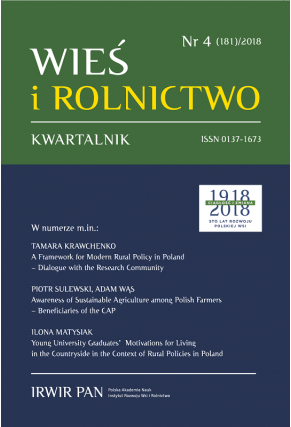Smart Villages in EU Policy: How to Match Innovativeness and Pragmatism?
DOI:
https://doi.org/10.53098/wir042018/09Keywords:
smart villages, smart rural development, rural development policy, European Union (EU) policy, European Network for Rural Development (ENRD)Abstract
Smart Villages is an approach to rural development which has been under discussion in the EU as one of the subthemes that the ENRD is working on. For this reason, the Thematic Group (TG) on Smart Villages was launched in 2017. Since then it has been contributing to the definition of smart villages, discussing the changes in rural development policy and opportunities for providing support for smart villages, exchanging experience and best practices in smart rural development, and serving as a forum for dialogue between various rural stakeholders. This paper outlines the discussion held during the selected meetings of the TG and briefly indicates the academic background of the approach discussed. Its aim was to present Smart Villages in terms of EU policy. Hence, the paper presents the genesis of the EU debate, highlights some of the dilemmas of the definition of smart villages, indicates the role of the territorial governments and the EU in creating the conditions for implementing the approach, and shows the selected examples of smart rural development. Smart Villages is an alternative way of thinking about the quality of rural life, and it seems to respond to the way the EU policy is evolving. However, it calls for better tailored tools and instruments, which applies both to EU policies and national/regional sources. It also calls for regional and local governments to play their role in the process.
References
Bajer M. (2012). Technologie informacyjno-komunikacyjne jako narzędzie ograniczania dysparytetów społeczno-ekonomicznych wsi w Unii Europejskiej. Wieś i Rolnictwo, 154 (1), 65–84. DOI: https://doi.org/10.53098/wir.2012.1.154/06
Baldock D., Dwyer J., Lowe P., Petersen J.E., Ward, N. (2001). The nature of rural development: Towards a sustainable integrated rural policy in Europe. London: Institute for European Environmental Policy.
BBC (British Broadcasting Company) (2014). Social and Economic Changes in Rural Areas in MEDCs, http://www.bbc.co.uk/schools/gcsebitesize/geography/rural_environments/-changes_rural_areas_medcs_rev1.shtml [access: September 2018].
Boyle P., Halfacree K. (eds.) (1998). Migration into Rural Areas: Theories and Issues. John Wiley and Sons.
Crouch D. (2006). Tourism, consumption and rurality. In: P. Cloke, T. Marsden, P. Mooney (eds.), Handbook of Rural Studies (pp. 355–364). London: Sage. DOI: https://doi.org/10.4135/9781848608016.n25
EC (European Commission) (2017). https://ec.europa.eu/agriculture/sites/agriculture/files/rural-development-2014-2020/looking-ahead/rur-dev-small-villages_en.pdf [access: September 2018].
ENRD (European Network for Rural Development) (2018). Smart Villages. Revitalising Rural Services. EU Rural Review, 26. Luxembourg: Publications Office of the European Union.
Estany G. (2018). Cowocat_Rural – Promoting Cooworking in Rural Catalonia. Poster on the ENRD Seminar on “Smart Villages: Revitalising Rural Services through Social and Digital Innovation”, Brussels, 22nd May 2018.
Galdeano-Gómez E., Aznar-Sánchez J.A., Pérez-Mesa J.C. (2011). The complexity of theories on rural development in Europe: An analysis of the paradigmatic case of Almería (South-East Spain). Sociologia Ruralis, 51 (1), 54–78. DOI: https://doi.org/10.1111/j.1467-9523.2010.00524.x
Halfacree K. (2012). Diverse ruralities in the 21st century: From effacement to (re-)invention. In: L.J. Kulcsar, K.J. Curtis (eds.), International Handbook of Rural Demography (pp. 387–400). International Handbooks of Population, 3. Springer Netherlands. DOI: https://doi.org/10.1007/978-94-007-1842-5_26
Hess S. (2018). Digital Villages: Germany. Poster on the ENRD Seminar on “Smart Villages: Revitalising Rural Services through Social and Digital Innovation”, Brussels, 22nd May 2018.
Idziak W., Wilczyński R. (2003). Odnowa wsi: Przestrzeń, ludzie, działania. Warsaw: Fundacja Programów Pomocy dla Rolnictwa FAPA.
Marples A., Rozes B. (2018). Rezo Pouce. Poster on the ENRD Seminar on “Smart Villages: Revitalising Rural Services through Social and Digital Innovation”, Brussels, 22nd May 2018.
Marsden T. (1999). Rural futures: The consumption countryside and its regulation. Sociologia Ruralis, 39 (4), 501–520. DOI: https://doi.org/10.1111/1467-9523.00121
Murdoch J., Pratt A. (1993). Rural studies: Modernism, postmodernism and the „post rural”. Journal of Rural Studies, 9, 411–427. DOI: https://doi.org/10.1016/0743-0167(93)90053-M
Naldi L., Nilsson P., Westlund H., Wixe F. (2015). What is smart rural development? Journal of Rural Studies, 40, 90–101. DOI: https://doi.org/10.1016/j.jrurstud.2015.06.006
OECD (Organisation for Economic Co-operation and Development) (2006). The New Rural Paradigm: Policies and Governance. Paris: OECD.
Ploeg J.D., van der, Renting H., Brunori G., Knickel K., Mannion J., Marsden T., de Roest K., Sevilla-Guzmán E., Ventura F. (2000). Rural Development: From Practices and Policies towards Theory. Sociologia Ruralis, 40 (4), 391–408. DOI: https://doi.org/10.1111/1467-9523.00156
Smart Villages: https://enrd.ec.europa.eu/enrd-thematic-work/smart-and-competitive-ru-ral-areas/smart-villages_en [access: September 2018].
Stavropoulos E. (2018). Integrated Approaches for Smart Villages. Presentation on the ENRD Seminar on “Smart Villages: Revitalising Rural Services through Social and Digital Innovation”, Brussels, 22nd May 2018.
Terluin I. (2003). Differences in economic development in rural regions of advanced countries: an overview and critical analysis of theories. Journal of Rural Studies, 19, 327–344. DOI: https://doi.org/10.1016/S0743-0167(02)00071-2
Visvizi A., Lytras M.D. (2018). Rescaling and refocusing smart cities research: From mega cities to smart villages. Journal of Science and Technology Policy Management, 9 (2), 126–133. DOI: https://doi.org/10.1108/JSTPM-07-2018-079
Ward N., Atterton J., Kim T.-Y., Lowe P., Phillipson J., Thompson N. (2005). Universities, the Knowledge Economy and ‘Neo-Endogenous Rural Development’. Newcastle upon Tyne: University of Newcastle upon Tyne, Centre for Rural Economy Discussion Paper Series, 1, 1–15.
Ward N., Brown D.L. (2009). Placing the rural in regional development. Regional Studies, 43(10), 1237–1244. DOI: https://doi.org/10.1080/00343400903234696
Wolski O. (2018). Problem (nie)innowacyjności w projektach odnowy wsi. Acta Universitas Lodziensis, Folia Geographica Socio-Oeconomica, 31, 17–37. DOI: https://doi.org/10.18778/1508-1117.31.02
Zavratnik V., Kos A., Stojmenova Duh E. (2018). Smart villages: Comprehensive review of initiatives and practices. Sustainability, 10(8), 2559–2573. DOI: https://doi.org/10.3390/su10072559
Zwolińska-Ligaj M., Guzal-Dec D., Adamowicz M. (2018). Koncepcja inteligentnego rozwoju lokalnych jednostek terytorialnych na obszarach wiejskich regionu peryferyjnego na przykładzie województwa lubelskiego. Wieś i Rolnictwo, 179(2), 247–280. DOI: https://doi.org/10.53098/wir022018/13











